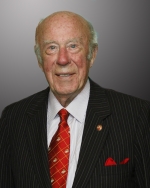George P. Shultz, a former secretary of state and corporate CEO, is currently a distinguished fellow at Stanford University’s Hoover Institution.

Speaking from his limo as it crossed San Francisco last month, George Shultz was optimistic, as usual, and laconic, as always, even if the subjects—California’s looming bankruptcy and nuclear war—bear their share of gloom and doom.
At 92, Shultz, a former U.S. secretary of state as well as past president of the worldwide construction behemoth Bechtel, always brings invaluable experience to such critical topics. That’s one reason he was asked to join the Think Long Committee—he’s also the one who came up with the name—to rescue California from itself.
While he credits Think Long as “a very good committee,” Shultz cautions that so far nothing has happened with the group’s recommendations; “We hope something will.”
“Our report,” he says of Think Long’s valedictory document, “A Blueprint to Renew California: Report and Recommendations,” “has in it a very important tax proposal, which is not on the ballot, but I think is far better than anything on the ballot.” There are two tax initiatives on California’s November ballot, one a sort of low bid from Gov. Jerry Brown (Proposition 30), and a “much longer one” from Molly Munger that raises taxes in large part to support education (Proposition 38). “But we hope they’ll be defeated, and the one that we propose can come forward.”
More of a Simpson-Bowles effort? Striking a balance between tax increases and expenditure cuts?
“That’s right.”
Shultz agreed that his time at the private experience with Bechtel was “helpful” in contributing to Think Long’s wide-ranging, cloistered meetings, but also pointed to his stints serving on reform efforts. “I did serve as chairman of an economic advisory committee when Pete Wilson was governor, and for Arnold Schwarzenegger when he was governor. So I’d learned something about California.”
The Reagan-era arms negotiator comes down as the same clipped communicator in his gruff words on nuclear disarmament, an issue that so far has gained zero traction in the current presidential campaign.
Shultz is not letting that stop him; he is a honcho in a “partnership,” the Nuclear Security Project, among four well-known Cold Warriors joined together to pursue worldwide elimination of these weapons. He and former Democratic Senator Sam Nunn, former Clinton administration Defense Secretary William Perry, and the ultimate practitioner of realpolitik, Henry Kissinger, signed four epochal Wall Street Journal op-eds. Shultz drafted the first paper that led to their final agreement, then took his chances and gave his draft to Kissinger when they were together in the same “camp” (Mandalay) at the Bohemian Grove.
“Henry is a reasonable guy,” Shultz insists. And the first op-ed signed by all four set forth a series of careful steps that lead to their vision of “Getting to Zero” on the future presence of nuclear arms everywhere in the world. Indeed, those three purposive words are the only emotive touch in the measured language of their appeal, so much in keeping with Shultz’s own quietude.
So, a bit out of the blue, I asked him if that traces back to his Quaker father? I heard him chortle. “Well, maybe. Quakers believe in being quiet. Don’t say anything unless you have something to say.”
(You might have heard that from him, I suggested, back in your hometown of Englewood, N.J.? Still chortling. “Interesting you bring it up because I never thought of it that way, but maybe there’s something to your point.”)
Quakers are also said to be enterprising, which is how Shultz describes their latest steps toward the vision of banishing nuclear weapons. “[The global community] recently had two conferences—one in Washington, D.C., one in Seoul, Korea—on what we call a nuclear enterprise, on getting control of fissile materials. That is a very important step. Yes, the United States and Russia have further work to do, reducing our arsenals, but it’s very important that this be seen as an enterprise involving all other countries because most of the things that need to be worked on … have broad applicability.”
But in Washington, only two members of Congress of either party showed up at a film screening the Nuclear Security Project hosted in Washington for members of Congress in 2011. And while President Obama has taken steps toward a limit of 1,550 U.S. intercontinental ballistic missiles (down from today’s 1,737) and mentioned, sotto voce, to Russia’s Dmitry Medvedev that missile talks could resume “after my election,” the candidate from Shultz’s own GOP has been mum.
“Governor Romney hasn’t spoken out on these subjects,” Shultz admits. “I hope that he will recognize that the United States will be much better off without nuclear weapons in the world. Obviously the campaign is preoccupied with other issues.”
Does that bother him?
“No, it doesn’t. I just assume that it’s best to be quiet on the subject because we don’t want it to be injected into a kind of partisan atmosphere. We have kept the enterprise on a nonpartisan basis, and that is the right place to keep it.” Then there’s Iran, a perfect example of what the partnership’s proposals address in seeking to negotiate—possibly control and limit—nuclear proliferation.
“I agree with the general view that it will a very bad thing for Iran to get a nuclear weapon, and we should be doing everything we can to see that they don’t get one.” Pause. “But — I — must — say …” His limo is stopping, to let him off. “I’m not impressed with the negotiating … at what has happened in the negotiations. There are other ways of going about it. But time is short.”
What would he have done differently?
Another careful pause. “If you are going to have negotiations,” he says succinctly, “negotiate about all the things you’re interested in. Not just one thing.”




